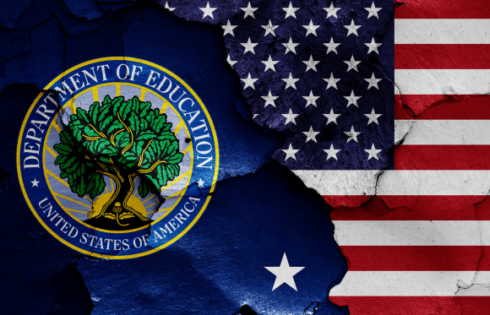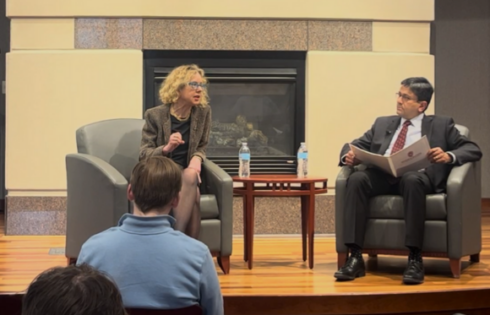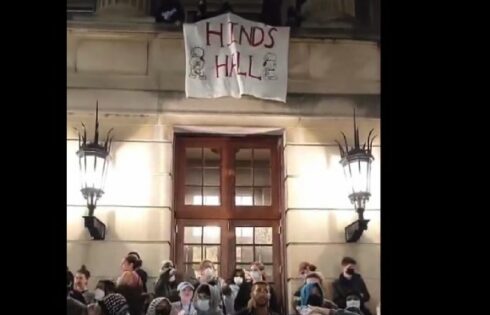
The official student newspaper of Woodrow Wilson High School in Washington, D.C., took its spat with its new principal to Change.org and the broader community of journalists – and, by some measures, won.
The Wilson Beacon, whose alumni include a former CBS Evening News anchor and New York Times columnist and whose slogan is “We do not take dictation,” blasted Principal Kimberly Martin for instituting a prior-review policy on the first day of school.
The backlash was so intense to the news, which went viral in a Beacon staff editorial Friday, that by Monday Martin had backed off a bit.
The Student Press Law Center reported that articles will now be reviewed “by either Martin or a newspaper adviser” and the editors will create a new “chain of responsibilities” and verify quotes before going to press.
Why do prior review? Because I’ve always done it that way
Before Martin’s compromise plan, the paper’s Change.org petition had reached nearly 700 signatures.
“Though Martin says that she will try not to censor anything we want to publish, prior review leads to self-censorship,” the petition states. “It is a fundamental shift in who holds ultimate responsibility for the content of our news.”
Martin left a top-performing high school in ritzy Aspen to lead the District’s largest high school, and she has a reputation as a reformer, according to a Washington Post profile in June. She even did a Q&A with the Beacon right after her announcement where she revealed she’s still working on her Ph.D. and she loves watching Game of Thrones.
Martin was cagey on whether she would institute prior review in that conversation with editor Erin Doherty, who is part of an overwhelmingly female staff:
ED: Do you believe in freedom of the press for us or do you believe in prior review of the paper for students?
KM: I think in the last three years here in Aspen, I probably had two discussions with the newspaper about something they were reporting. I wasn’t trying to censor the content, it was like this is not an accurate quote or you have to dig to find this information here. I certainly think even if it’s a perspective that’s unpopular, meaning, even if it’s something that’s negative against me or towards me, I totally understand that. However, I do think that the best papers have to be accurate and honest, and have fair reporting – there are ethical standards that have to be met.
The good feelings evidently didn’t last.
In its Friday staff editorial about the policy, the Beacon says Martin justified prior review by saying “that’s how she’s operated before,” and she didn’t budge when they explained the downsides, first and foremost that it’s “inefficient” for a modern media organization:
Not only has Martin requested that we send each issue to her before publication, but she also wants us to send her all web articles before posting them online. The Beacon website was created to share news quickly and keep our student body informed. Our web coverage of the resignation of former principal Pete Cahall, for instance, was praised by DC Urban Moms and Forest Hills Connection for its prompt publication. Even a small delay would keep our content from being as relevant as it could be.
The paper actually omitted quotes by several students who were critical of Cahall but refused to go on the record, the article explained. That’s exactly the kind of policy choice you’d think would earn points with Martin. Nope:
She explained that she worries that if The Beacon publishes inflammatory or incorrect information, it will reflect badly on her. But as student journalists with committed and experienced advisers, we hold ourselves accountable for our content. … Prior review takes away a crucial step in the journalism process: the step where we learn how to deal with mess-ups and complaints. …
Prior review would make the administration responsible for a paper they take no part in producing: if we were to publish something that got the paper into trouble, Martin would be held more accountable for the mistake than she would if she received the paper at the same time as everyone else.
‘Treat your students with dignity’
The clash got high-profile coverage and Twitter chatter.
Spent the last hour reading http://t.co/JPWJ7o0vmn. Great hope for local journalism. #DCPSRising
— Elissa Silverman (@tweetelissa) August 28, 2015
Censorship teaches young journalists the wrong thing about US citizenship, @Wilsonhsdcps. I’m with @thewilsonbeacon: https://t.co/9EjizpFAuW
— Eli Yokley (@eyokley) August 31, 2015
Just found out that @thewilsonbeacon has an online donation page. http://t.co/Fxyvdme6aM I’m sure they’d appreciate your support.
— Jeremy Bowers (@jeremybowers) August 31, 2015
https://twitter.com/tcwittes/status/637395458076356609
The Washington Post covered the “unprecedented” policy change, quoting Martin making this chilling statement of her priorities:
“It is my intention to make all decisions based on student learning and the decision of prior review is in line with my personal and professional philosophy as an educator,” Martin said in a statement provided to The Washington Post. “Keeping students safe and protected are parts of my job that I take very seriously.”
In other words, shielding students from ideas that aren’t “safe” and making sure they always feel “protected” go to the core of Martin’s philosophy.
It’s not clear to me that Martin has really changed her mind by yanking back on her original policy following the bad PR. She’s reserving the right to review articles until the editors send her new editorial policies that are “mutually agreed on,” the Beacon‘s updated editorial says.
College professors dealing with Wilson grads who demand trigger warnings – and threaten professors for exposing them to uncomfortable ideas – can thank Martin for setting the example.
Like The College Fix on Facebook / Follow us on Twitter
IMAGE: Shutterstock







Please join the conversation about our stories on Facebook, Twitter, Instagram, Reddit, MeWe, Rumble, Gab, Minds and Gettr.